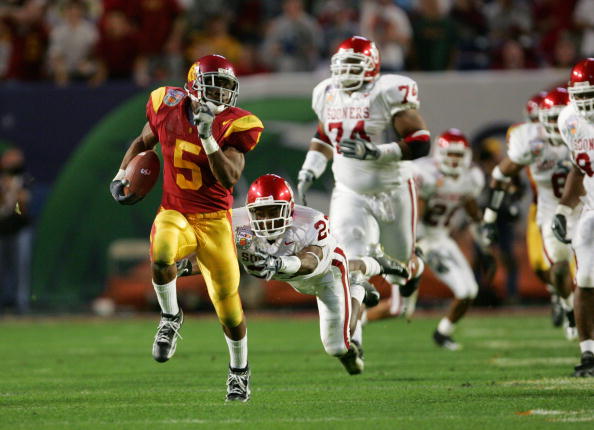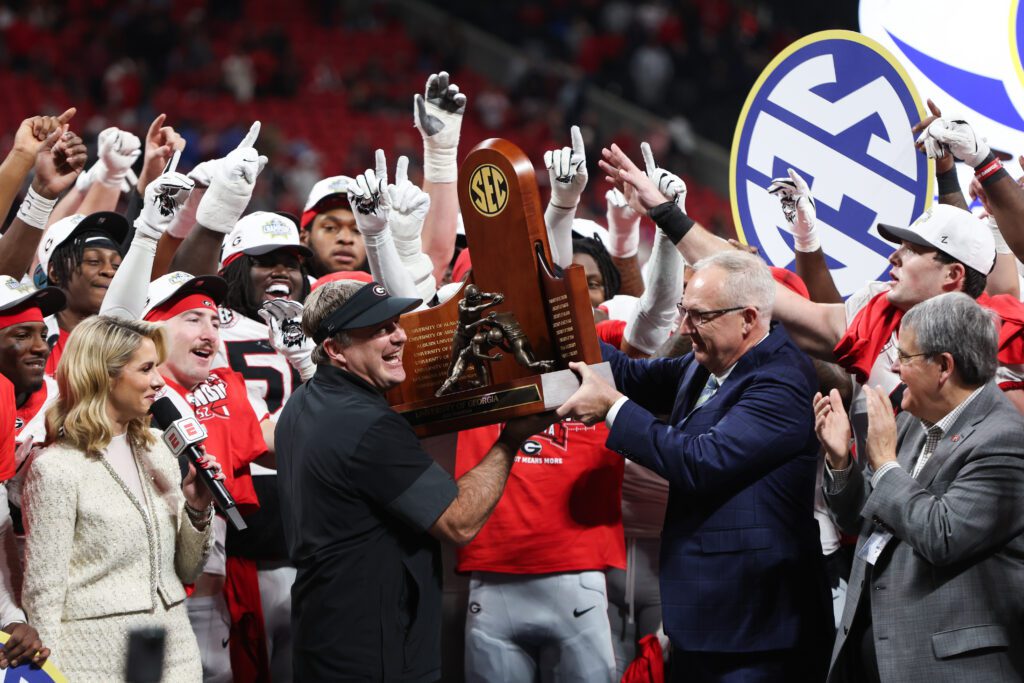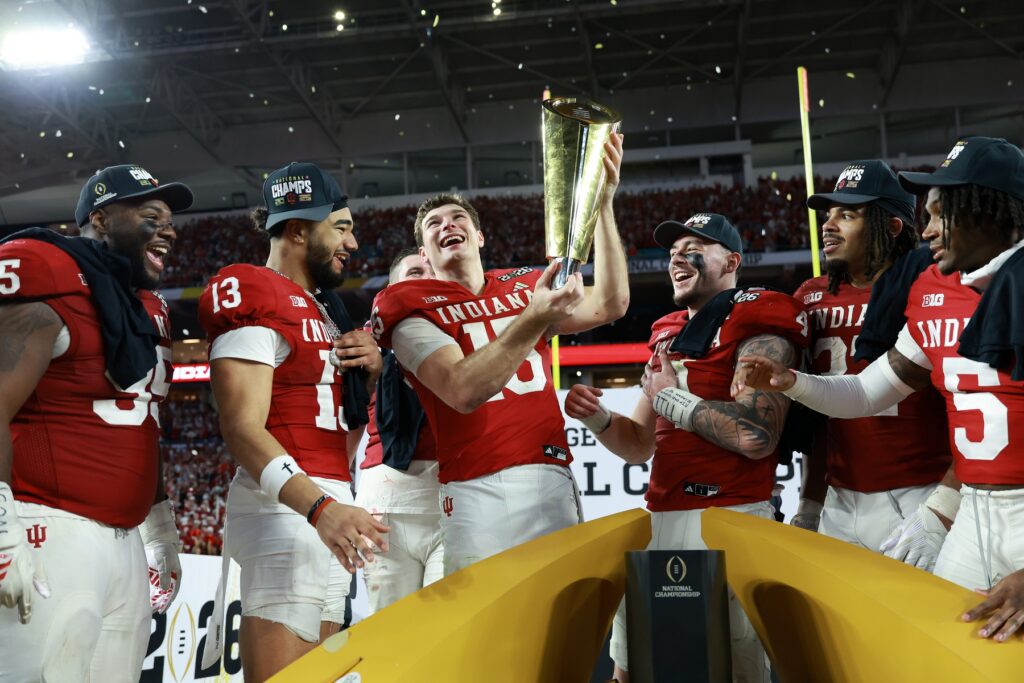The college football bowl season is well underway with the College Football Playoff semifinals set to occur within the next few days. Michigan will play TCU in the Fiesta Bowl and Georgia will play Ohio State in the Peach Bowl with a chance to advance to the CFP National Championship roughly a week later.
While the conversations around quality losses and limiting the amount of SEC teams feel commonplace in today’s college football talk, the playoff is only nine years old. Prior to the current four-team, plus one, format, the National Championship was decided with a single game: the BCS National Championship. The matchup was oftentimes decided by an algorithm, with limited input from those that watched the games on a weekly basis.
As one might expect, this created a lot of controversies, often more than we see on the Tuesday night Playoff selection shows that start towards the end of October in the current playoff format.
The BCS Era Year that Required a Playoff
As a fan growing up during the BCS era, there were many times when I wished there could have been one more game to decide the National Championship. The worthy teams couldn’t be narrowed down to just two, more needed to be settled on the field before feeling like a true champion could be crowned during that season.
It got me thinking about what seasons I’d like to go back and have playout in today’s format and what those games might look like. While a few come to mind, there is one season that I felt demanded a playoff for a couple of reasons:
- The four teams that would have made it would all have been undefeated.
- The Postseason results still left a lot of ambiguity about the best team that year.
Four Undefeated Teams
The 2004 season finished with three undefeated teams from a “Power 5 conference” and one “Group of 5” undefeated team. Throughout the season, the USC Trojans, Oklahoma Sooners, and Auburn Tigers all finished without a loss along with the Utah Utes, then a part of the Mountain West conference.
READ MORE: Expanding the College Football Playoff is a GOOD idea
USC was the defending National Champion going into the 2004 season — according to the AP Poll — after beating Michigan in the Rose Bowl the previous year. However, in a rare quirk, while they were the top team in the polls, they were not one of the top two teams according to the BCS formula and therefore were not in the BCS National Championship game in the 2003 season. With something to prove throughout the entire year, USC rolled through their opponents, only being tested once against California.
The quarterback for the Trojans was Matt Leinart, who went on to win the Heisman Trophy that season after throwing for 33 touchdowns to just six interceptions. Among his weapons that season was running back Reggie Bush, who would end up winning the Heisman Trophy the following year.
Oklahoma had appeared in the National Championship game the prior year and lost to LSU. Throughout the 2003 season, the Sooners appeared as though they could be an all-time team. They beat Texas, who was ranked 11th in the AP poll, 65-13, and preceded to roll through the rest of the Big XII conference until they played Kansas State in the Championship game.
Like USC, the Sooners also had something to prove after losing in the BCS National Championship game. They were anxious for a chance to redeem themselves since many wondered how good the previous year’s version of Oklahoma was. They were led by quarterback Jason White, who won the Heisman trophy the previous year.
The Trojans and Sooners started the year as the top two teams in the AP poll. So, for them to be left standing at the end of the year was no surprise to many in college football. However, the third undefeated Power 5 team, the Auburn Tigers, was a surprise. Auburn was ranked 17th in the AP poll to begin the 2004 season. They were led by a pair of first-round picks at running back, Cadillac Williams and Ronnie Brown.
The final undefeated team was the Utah Utes who were coached by a guy named Urban Meyer. During that era of college football, it was rare to see a “Group of 5” (often referred to as non-Automatic Qualifying) team make much noise, let alone compete for a National Championship, so their exclusion from the National Championship made sense. However, this still remained the only season in the BCS era in which an undefeated “Power 5” team was kept out of the National Championship.
No Clear Best Team
Auburn’s exclusion from the BCS National Championship was the most puzzling. Coming out of a strong SEC many thought they deserved a chance to play for the National Championship. The debate was mainly between Auburn and Oklahoma as many felt USC deserved a chance to defend its crown. Fans still remembered how the year ended for Oklahoma in 2003 with a 35-7 loss to Kansas State in the Big XII Championship and a 21-14 loss to LSU in the BCS National Championship.
The result of the BCS National Championship game didn’t do much to stop the debate as USC rolled over Oklahoma with a 55-19 win in the Orange Bowl. Auburn would win the Sugar Bowl, 16-13 over Virginia Tech and the college football season ended with two undefeated “Power 5” teams without an opportunity to play on the field.
Utah had a strong showing in their bowl game as well. The Utes were the first “Group of 5” team to play in a BCS bowl and beat the Pittsburgh Panthers 35-7 in the Fiesta Bowl.
Three undefeated teams were left at the end of the 2004 season. A problem that could have been solved with the addition of one more game at the end of the year. A playoff with USC playing Utah and Oklahoma playing Auburn would have left no doubt as to who the best team was.
Many could argue that because of how dominant the Trojans were in the BCS National Championship game that it is fair to say they were deserving of the National Championship. Especially because that USC team would eventually be known as one of the best in College Football. In addition to winning the National Championship the year prior, USC went undefeated during the 2005 regular season, eventually losing to Texas in a classic Rose Bowl game for the BCS National Championship.
However, fans will always wonder if the BCS formula got it right that year. Was Oklahoma the right team to challenge USC or was the best team in college football playing in the Sugar Bowl?
Main Image:



